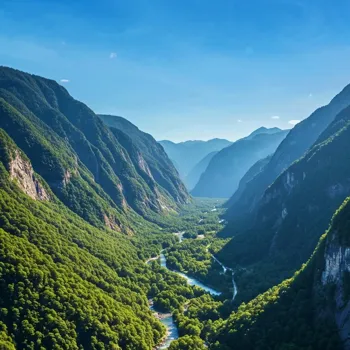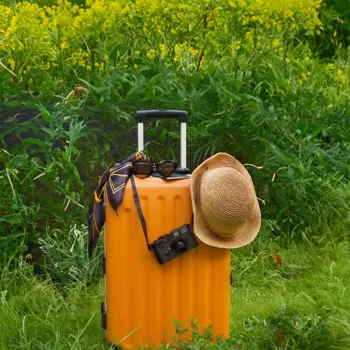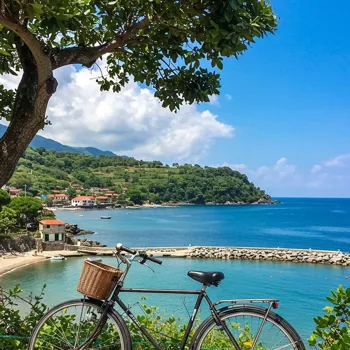Discover 8 sustainable travel practices for conscious explorers. Reduce your carbon footprint and be kind to the planet
Folks, travelling is a wonderful thing, isn't it? Seeing new places, meeting new people,
experiencing different cultures – it broadens the mind and fills the soul. But, and there's always a but, all this exploring can sometimes come at a cost to our beautiful planet.

Think about the carbon emissions from flights, the plastic waste from single-use bottles, and the impact on local communities. Worry not though, travel bugs! You can definitely see the world and still be kind to Mother Earth. How, you ask?
Let's explore some sustainable practices that'll turn you into a conscious explorer.
Packing light benefits environment, easier travel. Reduce weight, use reusable items
One of the easiest things you can do is pack light. Seriously, do you really need that third pair of shoes? A lighter bag means less fuel consumption for planes, trains, and automobiles.

Choose versatile clothing items that you can mix and match, and consider using travel-sized toiletries to minimise weight. You can also look for refillable containers once you reach your destination. Packing light not only helps the environment but also makes your travels less cumbersome.
Imagine lugging around a giant suitcase versus gliding through airports with a minimalist backpack. The choice is pretty clear, isn't it? Plus, you'll have more room for souvenirs! Don't forget to pack a reusable water bottle and a reusable shopping bag.
These two simple items can significantly reduce your plastic consumption while you're on the go. Think about all those plastic water bottles you avoid by simply filling up your own.
And that reusable shopping bag will be your best friend at local markets, ensuring you don't contribute to the plastic bag pile-up.
Choose eco-friendly transport options for sustainable travel
Next up, let's talk about transportation. Flying is often the biggest contributor to your travel carbon footprint. so if possible, opt for slower, more sustainable modes of transport.
Trains and buses are often a more eco-friendly alternative, and they also give you chance to soak in breathtaking scenery. If you must fly, consider booking direct flights to reduce fuel consumption during takeoff and landing. Once you arrive at your destination, embrace public transportation.
Many cities have excellent metro systems, buses, and trams that are easy to navigate and far less polluting than renting a car. Walking and cycling are also fantastic ways to explore a new place while minimizing your environmental impact.
You'll get some exercise, discover hidden gems, and truly experience the local atmosphere. Think of those charming little streets you might miss speeding by in a car. Plus, you'll get to interact with locals and discover hidden gems that you won't find in any guidebook.
And if you do need to rent a car, consider opting for an electric or hybrid vehicle, if available.
Choose eco-friendly accommodations for sustainable travel
Now, let's discuss accommodation. When choosing a place to stay, look for eco-friendly hotels and guesthouses that are committed to sustainability. These establishments often have practices in place such as energy-efficient lighting, water conservation programmes, and waste reduction initiatives.
Look for certifications like LEED (Leadership in Energy and Environmental Design) or Green Globe, which indicate a commitment to environmental responsibility. You can also support locally owned businesses by staying in guesthouses or family-run hotels.
This way, you're contributing directly to the local economy and helping to preserve cultural heritage. Consider homestays as well.
This offers a unique opportunity to connect with local families, learn about their culture firsthand, and reduce your environmental impact by staying in an existing home.
Another excellent option is to explore eco-lodges, which are often located in natural settings and focus on sustainable tourism practices. These lodgings minimise their impact on the environment, support local communities, and provide guests with opportunities to learn about conservation efforts.
Embrace local cuisine when traveling to support communities
Eating is a big part of the travel experience. Embrace local cuisine and support local farmers and food vendors. Visiting local markets is a fantastic way to discover fresh, seasonal produce and sample authentic dishes.

It's also a great way to connect with the community and learn about local traditions. When dining at restaurants, try to opt for places that source their ingredients locally and practice sustainable food preparation methods.
Reduce food waste by ordering only what you can eat and taking leftovers with you. Be mindful of your consumption habits and try to avoid restaurants that rely heavily on processed or imported foods.
Supporting local food systems not only reduces your environmental impact but also helps to preserve cultural heritage and promote economic development in the area. You'll be surprised by the incredible flavours and unique dishes you can discover by venturing beyond the usual tourist spots.
Plus, you will be supporting local farmers and artisans.
Respect local cultures for sustainable travel: learn, dress modestly, support artisans, and be mindful
Respecting local cultures and traditions is also crucial for sustainable travel. Before you go, take some time to learn about the customs, etiquette, and social norms of the place you're visiting. Dress modestly when visiting religious sites or conservative areas.

Obtain permission before taking photographs of people, especially in rural areas. Be mindful of your behaviour and avoid actions that could be offensive or disrespectful. Support local artisans and craftspeople by buying souvenirs directly from them.
This ensures that your money goes directly to the people who created the items, rather than to large corporations. When participating in cultural activities, such as ceremonies or performances, be respectful and follow the guidance of local guides.
By respecting local cultures and traditions, you can foster positive relationships with the community and contribute to the preservation of their heritage.
Minimize waste in tourist spots for environmental protection
Finally, let's talk about minimizing waste. One of the biggest challenges in many tourist destinations is the amount of waste generated by visitors. You can make a big difference by reducing your own waste and encouraging others to do the same.

Carry your own reusable water bottle, shopping bag, and coffee cup to avoid single-use plastics. Refuse straws, plastic cutlery, and other unnecessary items offered at restaurants and cafes. Pack your own reusable toiletries to reduce the need for travel-sized products.
When purchasing souvenirs, choose items that are made from sustainable materials and locally sourced. Dispose of your waste responsibly by using recycling bins and composting facilities whenever possible.
If you're visiting a place where waste management infrastructure is lacking, consider packing out your trash to dispose of it properly elsewhere. By minimizing waste, you can help to protect the environment and keep tourist destinations clean and beautiful for future generations.
After all, we want others to enjoy the same travel spots!
AI Generated Content. Glance/InMobi shall have no liability for the content











